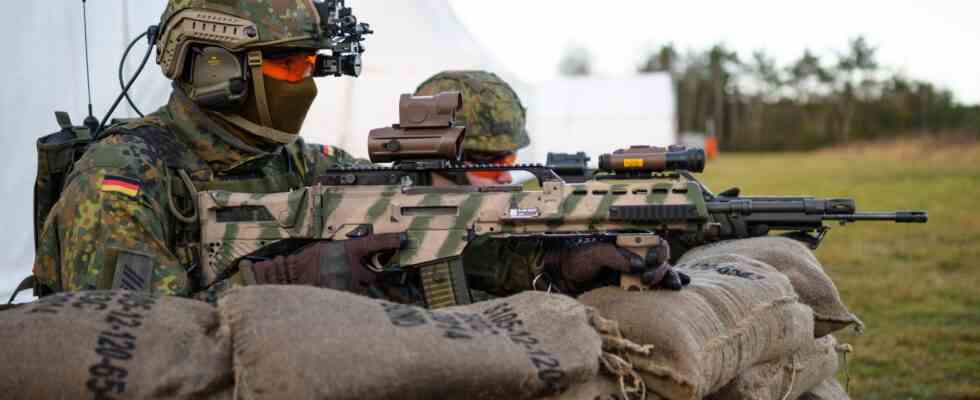Status: 07/07/2022 11:51 a.m
A law is intended to accelerate the procurement of material and weapons for the Bundeswehr. However, there is no structural change. Critics fear more corruption. The industry says: Topic missed.
“BwBBG” accelerates “BAAINBw”. What reads like the beginning of a bad joke by the authorities is to be launched in the Bundestag tonight: The “Bundeswehr Procurement Acceleration Act (BwBBG)” is intended to give the “Federal Office for Equipment, Information Technology and Use of the Bundeswehr (BAAINBw)” more speed and efficiency in procurement bring weapons and material.
SPD Defense Minister Christine Lambrecht sees “tangible simplifications and accelerations in procurement law.” The law is intended to ensure that the additional billions arrive in the troops and do not seep away in the administrative swamp of the authorities. “Now the hesitation and procrastination are over,” announced Lambrecht.
The BwBBG provides for exceptions to the applicable legal regulations. It is intended to facilitate joint European procurement. And it limits the ability of unsuccessful bidders to challenge BAAINBw decisions. The legal dispute over the G36 assault rifle that has just been settled shows how long such processes can take. The tender for the new assault rifle began five years ago. 15 months passed from the time the unsuccessful bidder complained to the decision of the Higher Regional Court in Düsseldorf.
Breathe a sigh of relief in Koblenz
In a statement for the Bundestag, the Vice President of the Procurement Office headquartered in Koblenz, Kornelia Annette Lehnigk-Emden, assessed the proposed legislation as “extremely positive”. The almost 12,000 employees of the mammoth authority have recently faced severe criticism, including from politicians.
“Politicians make rules and the Bundeswehr administration sticks to them,” comments Jakob Gilles from the Bundeswehr Association of Civil Servants and Employees. “But then the same politicians say it’s taking too long.” He now hopes that the “security mentality in the office” will decrease as a result of the law and that “personnel capacities in the legal field” will be freed up. A structural reorganization with personnel consequences within the authority is not forthcoming.
“license to print money”
Members of the Bundestag from the Ampel parties praise the law: “For 16 years we have been trying to reform the procurement system in Germany, now we have taken an important step in the right direction,” says Joe Weingarten from the SPD, a member of the defense committee.
Sevim Dagdelen from the left, on the other hand, not only fears more corruption, but also rising prices at the expense of taxpayers due to less competition. “In this respect, this law is a further license to print money for the large German armaments companies, such as Rheinmetall, where politicians from the Union and FDP are already on the supervisory board or as consultants and gild their address books from the government period.”
criticism from the industry
The industry falls short of the reform. Faster planning and approvals by the ministry and the authorities are needed even before the award. And “from the point of view of the industry, professionalization and digitization of the procurement procedures, which has been necessary for years, would be a more effective contribution to accelerating all public procurement,” write the Federal Association of the German Security and Defense Industry and the Federation of German Industries (BDI) in their statements, word for word.
Apparently tons of paper are carted to Koblenz for testing. The BDI also called for a reduction in bureaucracy through less parliamentary control. The budget committee must also approve armaments projects from 25 million euros. The BDI calls for this limit to be increased.
More decentralization needed
The planned law is limited to the end of 2025 for legal reasons. Whether it actually gets guns into the army faster remains to be seen. It doesn’t seem to be the last word: “We are currently working on improving the procurement processes overall,” writes BAAINBw Vice President Lehnigk-Emden. Greater decentralization would be conceivable, away from the authorities in Koblenz and towards the soldiers in the troops themselves.
So far, it has only been possible to procure material there on a small scale. SPD defense politician Weingarten demands at least fewer maintenance tasks from the administration in the long term. “The office in Koblenz must be relieved so that it can fully concentrate on procurement.”

